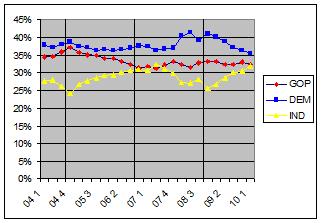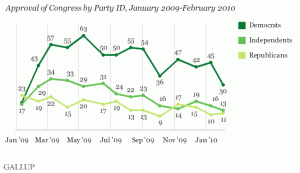Rasmussen usually makes a good-faith effort to avoid being sardonic, but sometimes they just can’t help themselves (bolding mine):
…voters are closely divided over Congress’ most important role: 49% say it’s passing good legislation, while 43% see it as preventing bad legislation from becoming law. That’s why 39% of voters say it’s a good thing in today’s political climate to be the Party of No. But 34% disagree and say it’s not a good thing.
Seventy-four percent (74%) of voters correctly identify Republicans as the political party some have labeled the Party of No. Despite, or perhaps because of, this high level of awareness, Republicans have built a solid lead over Democrats on the Generic Congressional Ballot.
The title of this Rasmussen Report, by the way: “57% Have More Trust In Those In Congress Who Voted Against Bailouts.” And that’s not even the worst news for Democrats in there. The worst news for Democrats in there is that they’ve spent the last year viciously attacking a movement that 52% of the population thinks has a better grasp of current affairs than the average Member of Congress. Because that isn’t going to translate as ‘throw all of them out;’ it’s going to translate to ‘throw all of them who are standing in the way out”…
Moe Lane
Crossposted to RedState.


